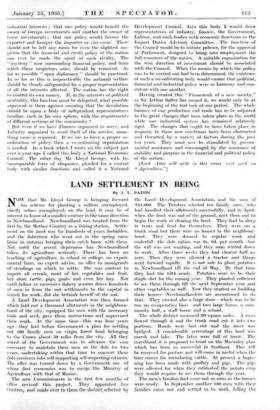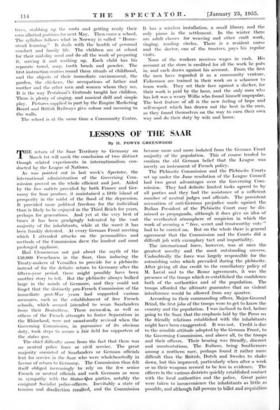LAND SETTLEMENT IN BEING
By J. L. PATON
NOW that - Mr. Lloyd George is bringing forward his scheme for planting a million . unemployed, chiefly urban unemployed, on the land, it may . be of interest toknow of a smaller venture in the same direction in Newfoundland.. Newfoundland was treated from the first ,by the Mother Country as a fishing station. Settle- ment on the land was for hundreds of years forbidden, and the fishermen who went out in the spring came home in autumn bringing .their catch home with them. Not until the recent depression has Newfoundland taken its agriculture seriously. There has been no teaching of agriculture in school or college, no experi- mental farm, no expert advice, no offer to immigrants of steadings on which to settle. She was content to import all cereals, most of her vegetables and fruit, her store 'cattle,. pigs, goats and even her hay. Not -until failure in successive fishery seasons drove hundreds of men in from the out settlements to the capital in search for work, did she bethink herself of the soil.
A Land Development Association was then formed which. laid out a thousand allotments in the neighbour- hood of the city, equipped the men with the necessary tools and seed, gave. them instructions and supervised their work. At the same time—this was four years ago-they laid before Government a plan for settling out 100 family men on virgin forest land belonging to the Crown about 50 miles from the city. All they asked of the. Government was to advance the sum necessary to maintain these men on the dole . for two years, undertaking within that time- to. convert these dole-receivers into self-supporting self-respecting citiiens. The offer was turned down by a Government One of whose first. economies was to merge . the MiniStry of Agriculture . with that of Marine.
.The new Commissioners in the first few months of office revived this project. . They . appointed five trustees, and made over to them the district, selected • by the Land Development Association, and the sum of $44,000. The Trustees selected ten family ,men, who had handled their allotments successfully, and in April, when the frost was out of the ground, sent them out to begin the work of clearing the land. They had to sleep in tents and fend for themselves. They were on a trunk road but there were no houses in the neighbour- hood. They were disused to regular work and underfed—the dole ration was 6s. 6d. per month—but the will was not wanting, and they soon settled down to work. After three weeks they had cleared half an acre. Then they were allowed a tractor and things went forward rapidly. It is not safe to plant potatoes in Newfoundland till the end of May. By that time they had the filth ready. Potatoes were to be their staple diet for the coming year. They planted sufficient to. sec them through till the next September year and other vegetables as welt. Now they started on building their houses—Newfoundlanders are accustomed to do that. They erected also a large store—which was to be run on co-operative lines—and two large barns, a com- munity hall, a staff house and a school.
The whole district. measured 39 square miles. A river flowed through it and the trunk road cut it into two portions. Roads were laid out and the river was bridged. A considerable percentage of this land was marsh and lake. The lakes were full of trout. The marshland it is proposed to treat on the Macauley plan which has been so successful in Scotland. This will be reserved for pasture and will come in useful when the time conies for introducing cattle. At present a begin- ning has been .made with poultry and pigs. The pigs were allowed for when they estimated the potato crop they would require to see them b out the year. The men's families .had come out so soon.as the houses were ready. In September another 130 men with their families came out and settled in to work, felling the trees, stubbing up the roots and getting ready their own allotted portions for next May. Then came a school. The syllabus follows what in Norway is called " Home- stead learning." It deals with the health of personal conduct and family life. The children are at school for their mid-day meal and do all the work of preparing it, serving it and washing up. Each child has his separate towel, soap, tooth brush and powder. The first instruction centres round these rituals of childhood, and the objects of their immediate environment, the garden, the chickens, the occupations of father and mother and the other men and women whom they see. It is the way Pestalozzi's Gertrude taught her children. There is plenty of singing, and musical drill and simple play. Pictures supplied in part by the Empire Marketing Board and British Railways give colour and meaning to the walls.
The school is at the same time a Community Centre. It has a wireless installation, a small library and the only piano in the settlement. In the winter there are adult classes • for weaving and other craft work, singing, reading circles. There is a resident nurse and the doctor, one of the trustees, pays his regular visits.
None of the workers receives wages in cash. His account at the store is credited for all the work he puts in, and each draws against his account. From the first the men have regarded it as a community venture. Fishermen are trained in their work on a schooner to team work. They set their face against a slacker, for their work is paid by the hour, and the only man who has left was a weary Willie who found himself unpopular. The best feature of all is the new feeling of hope and self-respect which has drawn out the best in the men, as they found themselves on the way to earn their own way and do their duty by wife and home.















































 Previous page
Previous page